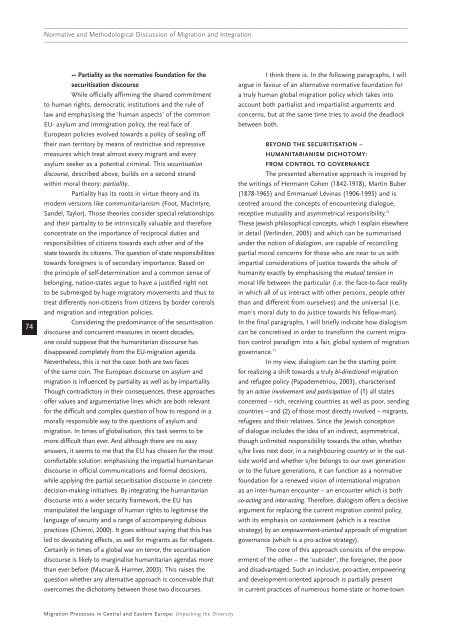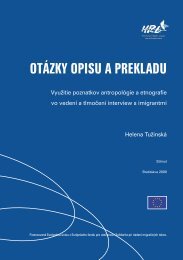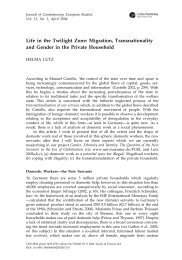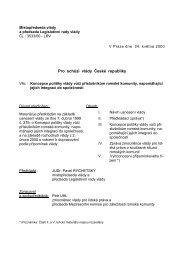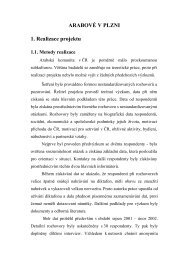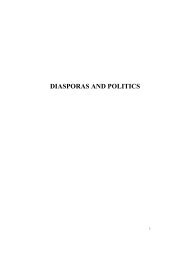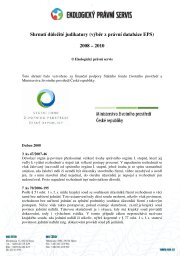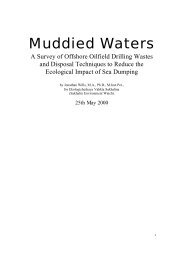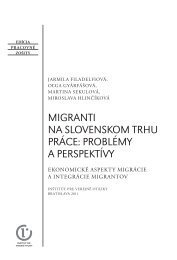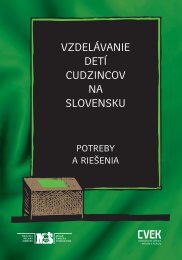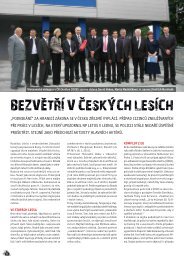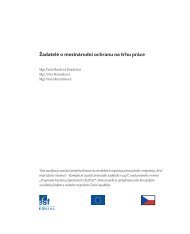Migration Processes in Central and Eastern Europe - Multiple Choices
Migration Processes in Central and Eastern Europe - Multiple Choices
Migration Processes in Central and Eastern Europe - Multiple Choices
Create successful ePaper yourself
Turn your PDF publications into a flip-book with our unique Google optimized e-Paper software.
———————————————————————————————————————————————————————————————<br />
Normative <strong>and</strong> Methodological Discussion of <strong>Migration</strong> <strong>and</strong> Integration<br />
———————————————————————————————————————————————————————————————<br />
74<br />
•• Partiality as the normative foundation for the<br />
securitisation discourse<br />
While officially affirm<strong>in</strong>g the shared commitment<br />
to human rights, democratic <strong>in</strong>stitutions <strong>and</strong> the rule of<br />
law <strong>and</strong> emphasis<strong>in</strong>g the 'human aspects' of the common<br />
EU- asylum <strong>and</strong> immigration policy, the real face of<br />
<strong>Europe</strong>an policies evolved towards a policy of seal<strong>in</strong>g off<br />
their own territory by means of restrictive <strong>and</strong> repressive<br />
measures which treat almost every migrant <strong>and</strong> every<br />
asylum seeker as a potential crim<strong>in</strong>al. This securitisation<br />
discourse, described above, builds on a second str<strong>and</strong><br />
with<strong>in</strong> moral theory: partiality.<br />
Partiality has its roots <strong>in</strong> virtue theory <strong>and</strong> its<br />
modern versions like communitarianism (Foot, MacIntyre,<br />
S<strong>and</strong>el, Taylor). Those theories consider special relationships<br />
<strong>and</strong> their partiality to be <strong>in</strong>tr<strong>in</strong>sically valuable <strong>and</strong> therefore<br />
concentrate on the importance of reciprocal duties <strong>and</strong><br />
responsibilities of citizens towards each other <strong>and</strong> of the<br />
state towards its citizens. The question of state responsibilities<br />
towards foreigners is of secondary importance. Based on<br />
the pr<strong>in</strong>ciple of self-determ<strong>in</strong>ation <strong>and</strong> a common sense of<br />
belong<strong>in</strong>g, nation-states argue to have a justified right not<br />
to be submerged by huge migratory movements <strong>and</strong> thus to<br />
treat differently non-citizens from citizens by border controls<br />
<strong>and</strong> migration <strong>and</strong> <strong>in</strong>tegration policies.<br />
Consider<strong>in</strong>g the predom<strong>in</strong>ance of the securitisation<br />
discourse <strong>and</strong> concurrent measures <strong>in</strong> recent decades,<br />
one could suppose that the humanitarian discourse has<br />
disappeared completely from the EU-migration agenda.<br />
Nevertheless, this is not the case: both are two faces<br />
of the same co<strong>in</strong>. The <strong>Europe</strong>an discourse on asylum <strong>and</strong><br />
migration is <strong>in</strong>fluenced by partiality as well as by impartiality.<br />
Though contradictory <strong>in</strong> their consequences, these approaches<br />
offer values <strong>and</strong> argumentative l<strong>in</strong>es which are both relevant<br />
for the difficult <strong>and</strong> complex question of how to respond <strong>in</strong> a<br />
morally responsible way to the questions of asylum <strong>and</strong><br />
migration. In times of globalisation, this task seems to be<br />
more difficult than ever. And although there are no easy<br />
answers, it seems to me that the EU has chosen for the most<br />
comfortable solution: emphasis<strong>in</strong>g the impartial humanitarian<br />
discourse <strong>in</strong> official communications <strong>and</strong> formal decisions,<br />
while apply<strong>in</strong>g the partial securitisation discourse <strong>in</strong> concrete<br />
decision-mak<strong>in</strong>g <strong>in</strong>itiatives. By <strong>in</strong>tegrat<strong>in</strong>g the humanitarian<br />
discourse <strong>in</strong>to a wider security framework, the EU has<br />
manipulated the language of human rights to legitimise the<br />
language of security <strong>and</strong> a range of accompany<strong>in</strong>g dubious<br />
practices (Chimni, 2000). It goes without say<strong>in</strong>g that this has<br />
led to devastat<strong>in</strong>g effects, as well for migrants as for refugees.<br />
Certa<strong>in</strong>ly <strong>in</strong> times of a global war on terror, the securitisation<br />
discourse is likely to marg<strong>in</strong>alise humanitarian agendas more<br />
than ever before (Macrae & Harmer, 2003). This raises the<br />
question whether any alternative approach is conceivable that<br />
overcomes the dichotomy between those two discourses.<br />
I th<strong>in</strong>k there is. In the follow<strong>in</strong>g paragraphs, I will<br />
argue <strong>in</strong> favour of an alternative normative foundation for<br />
a truly human global migration policy which takes <strong>in</strong>to<br />
account both partialist <strong>and</strong> impartialist arguments <strong>and</strong><br />
concerns, but at the same time tries to avoid the deadlock<br />
between both.<br />
BEYOND THE SECURITISATION –<br />
HUMANITARIANISM DICHOTOMY:<br />
FROM CONTROL TO GOVERNANCE<br />
The presented alternative approach is <strong>in</strong>spired by<br />
the writ<strong>in</strong>gs of Hermann Cohen (1842-1918), Mart<strong>in</strong> Buber<br />
(1878-1965) <strong>and</strong> Emmanuel Lév<strong>in</strong>as (1906-1995) <strong>and</strong> is<br />
centred around the concepts of encounter<strong>in</strong>g dialogue,<br />
receptive mutuality <strong>and</strong> asymmetrical responsibility. 10<br />
These Jewish philosophical concepts, which I expla<strong>in</strong> elsewhere<br />
<strong>in</strong> detail (Verl<strong>in</strong>den, 2005) <strong>and</strong> which can be summarised<br />
under the notion of dialogism, are capable of reconcil<strong>in</strong>g<br />
partial moral concerns for those who are near to us with<br />
impartial considerations of justice towards the whole of<br />
humanity exactly by emphasis<strong>in</strong>g the mutual tension <strong>in</strong><br />
moral life between the particular (i.e. the face-to-face reality<br />
<strong>in</strong> which all of us <strong>in</strong>teract with other persons, people other<br />
than <strong>and</strong> different from ourselves) <strong>and</strong> the universal (i.e.<br />
man's moral duty to do justice towards his fellow-man).<br />
In the f<strong>in</strong>al paragraphs, I will briefly <strong>in</strong>dicate how dialogism<br />
can be concretised <strong>in</strong> order to transform the current migration<br />
control paradigm <strong>in</strong>to a fair, global system of migration<br />
governance. 11<br />
In my view, dialogism can be the start<strong>in</strong>g po<strong>in</strong>t<br />
for realiz<strong>in</strong>g a shift towards a truly bi-directional migration<br />
<strong>and</strong> refugee policy (Papademetriou, 2003), characterised<br />
by an active <strong>in</strong>volvement <strong>and</strong> participation of (1) all states<br />
concerned – rich, receiv<strong>in</strong>g countries as well as poor, send<strong>in</strong>g<br />
countries – <strong>and</strong> (2) of those most directly <strong>in</strong>volved – migrants,<br />
refugees <strong>and</strong> their relatives. S<strong>in</strong>ce the Jewish conception<br />
of dialogue <strong>in</strong>cludes the idea of an <strong>in</strong>direct, asymmetrical,<br />
though unlimited responsibility towards the other, whether<br />
s/he lives next door, <strong>in</strong> a neighbour<strong>in</strong>g country or <strong>in</strong> the outside<br />
world <strong>and</strong> whether s/he belongs to our own generation<br />
or to the future generations, it can function as a normative<br />
foundation for a renewed vision of <strong>in</strong>ternational migration<br />
as an <strong>in</strong>ter-human encounter – an encounter which is both<br />
co-act<strong>in</strong>g <strong>and</strong> <strong>in</strong>ter-act<strong>in</strong>g. Therefore, dialogism offers a decisive<br />
argument for replac<strong>in</strong>g the current migration control policy,<br />
with its emphasis on conta<strong>in</strong>ment (which is a reactive<br />
strategy) by an empowerment-oriented approach of migration<br />
governance (which is a pro-active strategy).<br />
The core of this approach consists of the empowerment<br />
of the other – the 'outsider', the foreigner, the poor<br />
<strong>and</strong> disadvantaged. Such an <strong>in</strong>clusive, pro-active, empower<strong>in</strong>g<br />
<strong>and</strong> development-oriented approach is partially present<br />
<strong>in</strong> current practices of numerous home-state or home-town<br />
<strong>Migration</strong> <strong>Processes</strong> <strong>in</strong> <strong>Central</strong> <strong>and</strong> <strong>Eastern</strong> <strong>Europe</strong>: Unpack<strong>in</strong>g the Diversity


